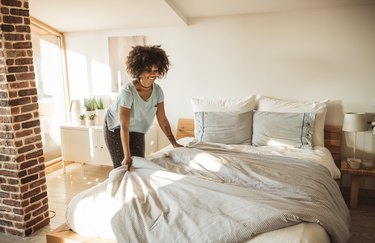
Fighting off a cold can sap your energy and leave you feeling pooped. But it can be tough to sleep when you're constantly coughing, sneezing or battling a fever.
To add insult to injury, many cold and flu symptoms worsen when your head hits the pillow (more on that later), interfering with sleep when your body needs it the most.
Video of the Day
Why Sleep Is So Important When You’re Sick
"Sleep is your quickest environment for healing," sleep specialist Michael Breus, PhD, author of The Power of When, tells LIVESTRONG.com.
That's because physical restoration occurs during sleep when growth hormone is produced. "This helps directly with cellular repair and an increase in killer T cells production, which in turn aids in fighting illness," Breus says.
And when you catch quality zzzs, your body is also able to create more interleukin-6, an integral component of the immune system known as a pro-inflammatory cytokine that plays a key role in the creation of T cells, adds Alexandra Kreps, MD, a board certified primary care physician with Tru Whole Care.
Here, Breus and Dr. Kreps offer tips to help you drift off to la la land, so you can sleep your way to a speedy recovery.
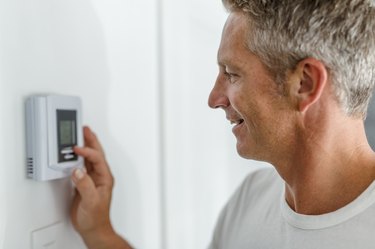
1. Keep It Cool
When you're sick, the secret to a sound night's sleep may lie with your thermostat. For the most comfortable, optimal sleeping conditions, dial down the heat.
Cooler temps can help you snooze more peacefully and promote better REM cycle sleep, Dr. Kreps says. Indeed, higher nighttime temperatures resulted in poorer quality sleep in a May 2017 study in Science Advances.
This may be because "warmer temperatures can interfere with your circadian rhythm by preventing the body from reducing its own thermostat," which can cause disruptions in normal sleep patterns, Dr. Kreps says.
Breus agrees: A cool environment mimics "your body's core body temperature rhythm, which is the natural rhythm that sleep follows as well."
The optimum temp? Somewhere between 60 and 67 degrees Fahrenheit, according to the National Sleep Foundation.
Related Reading
2. Switch Up Your Sheets
"Sick people sweat quite a bit, so bedsheets will be ripe with bacteria," Breus says.
So how do you keep your perspiration from piling up pesky pathogens (and possibly infecting your partner)? Wash your bedding often.
"Changing linens at least weekly is important in order to clean off any residual bacteria or viruses that can live on cloth material," says Dr. Kreps, adding, "those with allergies or asthma may need to change sheets more often due to the dust than can collect on sheets and cause exacerbating symptoms."
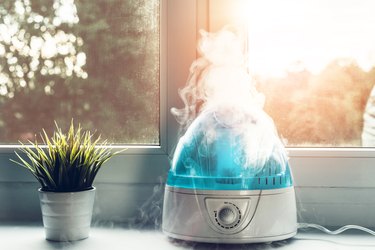
3. Have a Humidifier Handy
"A humidifier can help keep the respiratory tract moistened and reduce irritation in the lungs as well as reduce the transmission of infection from dry nasal passages and throat," Dr. Kreps says.
Indeed, according to a May 2019 research article in PNAS, low humidity decreases the immune system's ability to fight off the flu.
Homasy Cool Mist Humidifier
Buy it: Amazon.com; Price: $36.99
While studies are still underway to determine if this holds true for COVID-19, Breus says a humidifier may be helpful for those with the disease because it results in a dry cough. Using a humidifier may help ease some of that dryness and increase a person's comfort level, enabling better sleep.
Get tips on how to stay healthy, safe and sane during the novel coronavirus pandemic.
4. Fire Up Your Air Filter
A humidifier isn't the only handy tool you have at your disposable for enhancing your shut-eye when sick.
"A HEPA filter can also improve your sleep by trapping allergens such as dust mites, pet dander and mold spores, which can produce congestion, runny nose, sneezing and sinus headaches (if you are sensitive to these allergens) and cause you to wake up at night and/or have poorer sleep quality," Dr. Kreps says.
"Also, a person with a cough will expel all kinds of bacteria into the air," adds Breus, who explains that a HEPA filter can help clear and clean the environment of these nasty microbes.
LEVOIT Air Purifier
Buy it: Amazon.com; Price: $99.99
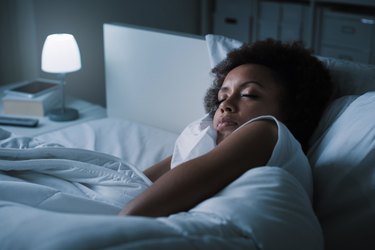
5. Buy a Bed Wedge
Getting a good night's slumber may be as simple as sleeping in an elevated position. That's because when you lie down, "postnasal drip fluid and mucus can collect in the lungs and respiratory tract and cause irritation and coughing in the middle of the night," Dr. Kreps explains.
Fortunately, there's an easy fix: Prop up your upper body with a wedge pillow.
"This is basic gravity at work," Breus says. "By raising the entire torso, and not just the head, you help open the airway," which will allow you to breathe easier and snooze more comfortably.
FitPlus Premium Wedge Pillow
Buy it: Amazon.com; Price: $29.95
6. Don’t Mix Medicines
You might think giving yourself a double dose of cold medicine before bed is beneficial. But mixing meds may sabotage your shut-eye and lead to some serious side effects.
Here's why: OTC cold remedies typically contain several active ingredients, including the common pain reliever acetaminophen. So, if you pop a cocktail of cold and cough pills before bed, you may be unintentionally overusing acetaminophen, which can lead to potential liver toxicity and damage, according to Harvard Health Publishing.
To be safe, always read the labels beforehand and choose a medication with just one active ingredient. Talk to the pharmacist or consult with your doctor about which meds are safe to combine.
7. Get More Magnesium
Important for muscle and nerve function, blood glucose control and blood pressure regulation, magnesium may also help with sleep and benefit your immune system, Dr. Kreps says.
Indeed, a small study found that taking magnesium supplements significantly increased sleep time and sleep efficiency in older adults with insomnia, per December 2012 research in the Journal of Research in Medical Sciences: The Official Journal of Isfahan University of Medical Sciences: However, more studies are still needed to support magnesium's use as a sleep aid.
Discuss with your health care provider before taking a magnesium supplement, as magnesium may interact with certain antibiotics and other medicines, according to the National Institutes of Health.
Click below to pin and save these tips for later!
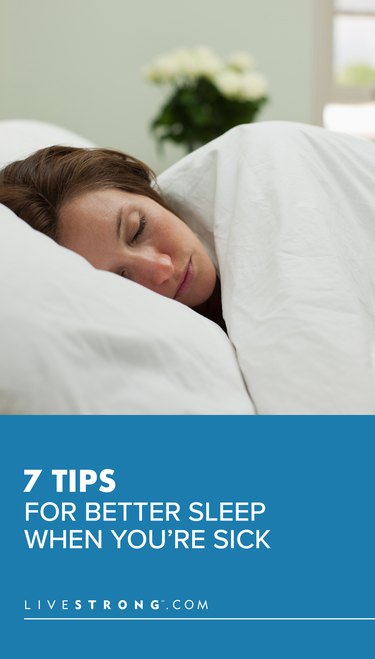
Concerned About COVID-19?
Read more stories to help you navigate the novel coronavirus pandemic:
- Science Advances: “Nighttime temperature and human sleep loss in a changing climate.”
- Harvard Health Publishing: “Cold and flu warning: The dangers of too much acetaminophen.”
- Journal of Research in Medical Sciences: The Official Journal of Isfahan University of Medical Sciences: “The effect of magnesium supplementation on primary insomnia in elderly: A double-blind placebo-controlled clinical trial.”
- National Institutes of Health Office of Dietary Supplements: “Magnesium Fact Sheet for Health Professionals.”
- National Sleep Foundation: "The Ideal Temperature for Sleep"
- PNAS: "Low ambient humidity impairs barrier function and innate resistance against influenza infection"
Is this an emergency? If you are experiencing serious medical symptoms, please see the National Library of Medicine’s list of signs you need emergency medical attention or call 911.